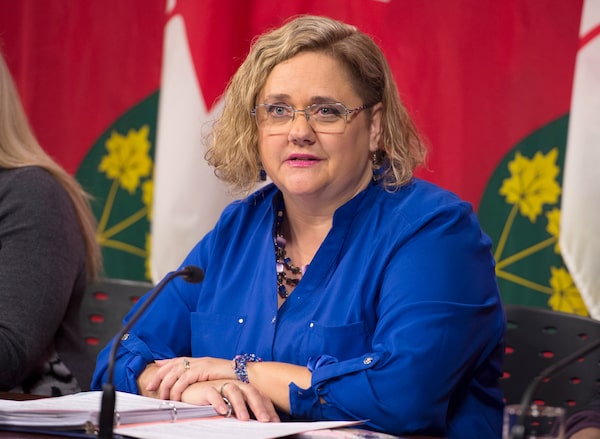
Laura Kirby-McIntosh, president of the Ontario Autism Coalition, speaks at a news conference at the Ontario Legislature in Toronto on Nov. 12, 2018.Frank Gunn/The Canadian Press
Disability advocates congregated at Queen’s Park on Wednesday morning demanding that the provincial government rein in the power of principals to exclude students with complex needs from schools across the province.
Both the Ontario Autism Coalition (OAC) and the Accessibility for Ontarians with Disabilities Act Alliance (AODA) called on Education Minister Lisa Thompson to hold a summit of key stakeholders – including parents, teachers, principals, school boards and students – where they can discuss possible legislation and policy changes surrounding exclusions of students with disabilities who are presenting behavioural issues. The groups also asked the minister to issue a policy directive to school boards imposing interim restrictions on when exclusions can be used.
“What is the Ford government going to do to rein in the excessive, unfair and arbitrary power of school principals to exclude students from school?” OAC president Laura Kirby-McIntosh asked.
“We just can’t leave the status quo in place,” said AODA Alliance chair David Lepovsky.
The Minister’s office responded Wednesday afternoon, with staff member Kayla Iafelice saying the government was aware of the issues cited by the OAC and AODA Alliance, and looked forward to providing an update on them “in the near future.”
The Wednesday call to action comes after a story by The Globe and Mail this month that found families with children who have intellectual and developmental disabilities are increasingly being asked to pick up children early, start their school day later or keep them home for days. Most school districts don’t formally track these kinds of exclusions or shortened days. Parent and advocacy groups have informally documented school exclusions, and have seen them rise in frequency. In December, the OAC wrote a letter to Ms. Thompson asking to meet about the issue, which it says has gone unanswered.
“I want to emphasize how incredibly vulnerable a family feels in the face of the might and the resources of a publicly funded school board and all of their lawyers,” Ms. Kirby-McIntosh said. “They are terrified and they are distressed. This is not a new problem, but until recent coverage sparked by The Globe and Mail … it’s now a subject finally getting public attention.”
The Globe’s January story highlighted the plight of Grayson Kahn, a seven-year-old boy with autism and behavioural issues who was expelled from his school in Guelph, Ont. The expulsion followed an incident where the boy struck an educational assistant, leaving her with bruises, scrapes and a concussion. Expulsions such as Grayson’s are rare – they involve a principal’s report and a hearing by a school board committee. Advocates for students with disabilities say exclusions are far more common and are typically informal; parents will be given oral notice of a decision made at a principal’s discretion.
Luke Reid, a lawyer at ARCH Disability Law Centre, said there is no formal legislative or policy limit on how long exclusions can last, and that there is often an absence of due process. “It’s sort of the Wild West in some ways,” he said. Ms. Kirby-McIntosh added there was “an appalling lack of data” chronicling the frequency at which such exclusions are occurring.
“Each principal is essentially allowed to be a law unto themselves,” she said. “We are not saying principals are bad people. They are working with an antiquated funding formula, a shortage of qualified staff and an increasingly complex student population."
Sam Hammond, president of the Elementary Teachers' Federation of Ontario (ETFO), said he agrees that long-term exclusions are “extremely problematic,” and endorsed the idea of a stakeholders meeting. The ETFO has been calling for an increase in direct funding for students with special educational needs, he said.
"I say this with all due respect to parents of autistic children and autistic children: What are teachers and administrators supposed to do when they have gotten to the end of the supports and the resources that are available to them?” Mr. Hammond asked.
The OAC and the AODA Alliance didn’t ask for additional resources Wednesday; Mr. Lepovsky said that “especially in the current economic situation and the current discretions in terms of funding,” he thought such a request would slow down their potential progress. “This government’s got fiscal constraints. It’s not a big expenditure to just get us to the table and get us talking, and for them to listen. And it’s not a big constraint to impose the policy directive," he said.
The Ontario Principals' Council disputes the idea that decisions on exclusions are made exclusively by a principal, and says it has logged an “unfortunate increase” in incidents involving violent or aggressive student behaviour in recent years. It said on Wednesday that exclusions were used only after other strategies proved unsuccessful.